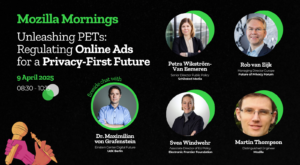Today, Mozilla filed a friend of the court brief with the Supreme Court in Google v. Oracle, the decade-long case involving questions of copyright for functional elements of Oracle’s Java SE. This is the fourth amicus brief so far that Mozilla has filed in this case, and we are joined by Medium, Cloudera, Creative Commons, Shopify, Etsy, Reddit, Open Source Initiative, Mapbox, Patreon, Wikimedia Foundation, and Software Freedom Conservancy.
Arguing from the perspective of small, medium, and open source technology organizations, the brief urges the Supreme Court to reverse the Federal Circuit’s holdings first that the structure, sequence, and organization (“SSO”) of Oracle’s Java API package was copyrightable, and subsequently that Google’s use of that SSO was not a “fair use” under copyright law.
At bottom in the case is the issue of whether copyright law bars the commonplace practice of software reimplementation, “[t]he process of writing new software to perform certain functions of a legacy product.” (Google brief p.7) Here, Google had repurposed certain functional elements of Java SE (less that 0.5% of Java SE overall, according to Google’s brief, p. 8) in its Android operating system for the sake of interoperability—enabling Java apps to work with Android and Android apps to work with Java, and enabling Java developers to build apps for both platforms without needing to learn the new conventions and structure of an entirely new platform.
Mozilla believes that software reimplementation and the interoperability it facilitates are fundamental to the competition and innovation at the core of a flourishing software development ecosystem. However, the Federal Circuit’s rulings would upend this tradition of reimplementation not only by prohibiting it in the API context of this case but by calling into question enshrined tenets of the software industry that developers have long relied on to innovate without fear of liability. With the consequence that small software developers are disadvantaged and innovations are fewer, incumbents’ positions in the industry are reinforced with a decline in incentive to improve their products, and consumers lose out. We believe that a healthy internet depends on the Supreme Court reversing the Federal Circuit and reaffirming the current state of play for software development, in which copyright does not stand in the way of software developers reusing SSOs for API packages in socially, technologically, and economically beneficial ways.











